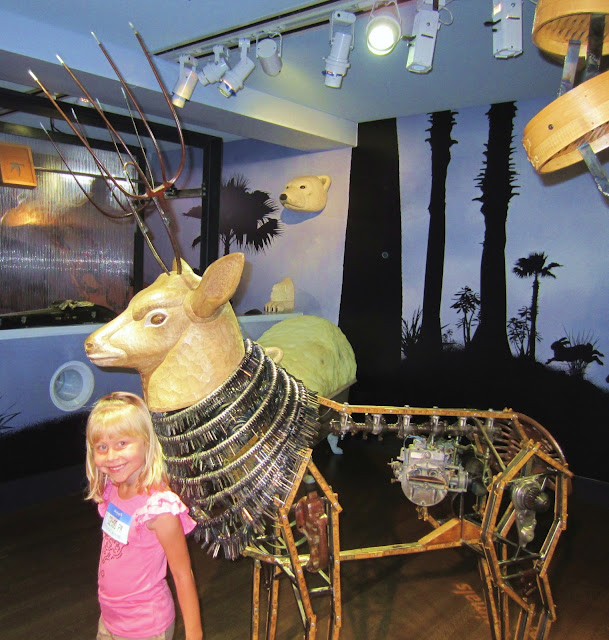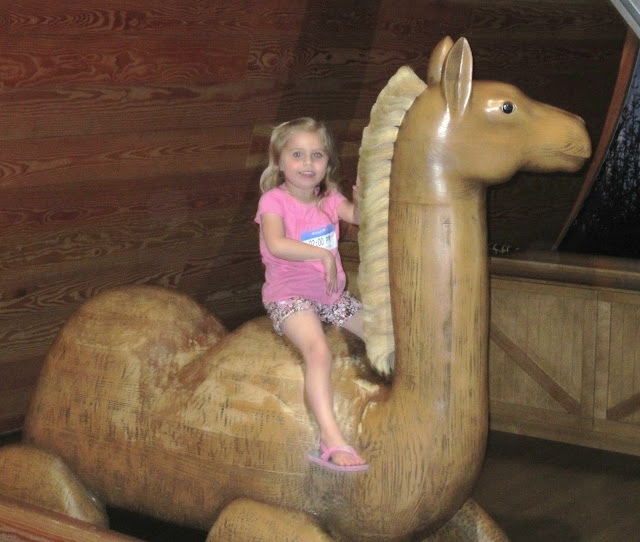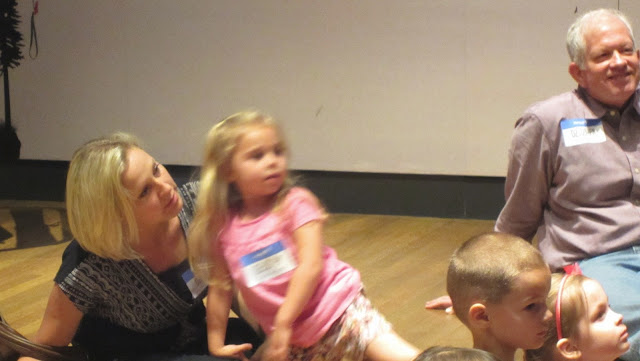There are seventeen members of my family living in Southern California right now (plus my sister Doris and her husband Reid in Bakersfield in central California), and we are making an effort to get together at least quarterly. Last Saturday we all met up at the Skirball Jewish Cultural Center at 2701 N. Sepulveda Blvd., Los Angeles.
Jack Skirball was a Jewish rabbi who took a leave of absence from his congregation in 1933 to produce educational movies, one of which was the controversial The Birth of a Baby, the first film to show the actual birth of a child. He eventually became a producer of mainstream movies, including a few Alfred Hitchcock flicks. In the 1950s, he began a third vocation as a real estate developer and was responsible for building San Diego's Vacation Village, a model for a slew of copycat resort hotels. It seems he was successful at just about everything he did, which is why he had plenty of money to donate to Jewish education, including building a cultural center in Los Angeles in the 1980s.
Six years ago, a new Noah's ark-themed children's museum opened in the Skirball. It is this museum where sixteen members of our family met on May 4th. (We really missed the always-working Andrew, who would have loved the creativity of this place, and I didn't think to notify Doris and Reid.)
We purchased our tickets in advance using a great discount coupon I found on Google. Only 100 people at a time are allowed into the museum, which makes for a nice, uncrowded experience. The museum is staffed by enthusiastic college-aged young people who tell stories, keep things tidy, and guide the children's experiences. We began by listening to the story of Noah, his ark, and a big storm that raged for forty days and nights. The children (and adults) listened carefully:
. . . and participated in demonstrating the rain:
. . . and just looked cute:
Our storyteller explained the theme of the museum, which is that "Noah's ark teaches us that second chances are possible." This quote comes from Lloyd E. Cotsen, the former president of Neutrogena who donated his collection of Noah's ark memorabilia and folk art from around the world.
A booklet available in the museum states: Here's our take on the story. It's about surviving the challenges life throws our way by getting along and working together, and about making the most of second chances. All of us have a role to play, so on this ark, all of us are Noahs. And guess what? All the animals are welcome, too--not just two of each, and not just the cute and cuddly ones. As it turns out, Noah's Ark is just one of hundreds of flood stories from around the world. In some tales, the ark is a walnut shell; in others, a hollowed-out pumpkin., But they all have huge storms, safe shelters, and new beginnings.
Isn't that wonderful?
One of the really fun things in the museum is that all the animals that have been created from odds and ends--materials "given a second chance" at life. The booklet notes, We used an old story, so we decided to use old stuff. Stuff from attics, stuff from e-bay, and some stuff right off the street. A John Deere tractor seat makes for a good deer derriere. And there's nothing here that lights up or reboots when you press a button. Our bells and whistles are actual bells and whistles.
There are 386 animals aboard this ark, each one a creative masterpiece. See if you can identify the unusual parts of Noah's animals, such as the pink purses used for these flamingos bodies:
Everything within reach of visitors is meant to be touched and explored.
There are multiple rooms in this museum, including a room on each side of the ark, and one large room within the ark. The ark measures 15 feet high, 41 feet wide, and 65 feet long. The booklet points out that this is not the size of the ark in the Bible, which it says was about the length of three football fields.
There are lots of friendly faces waiting to greet visitors to the ark:
. . . and there is a child-sized ark with its own collection of plastic animals for kids to play with:
This sign gives context to the displays of arks from around the world:

Inside the ark itself are all sorts of fun treasures, including dozens of animal puppets (two of each, of course):
All the little kids really enjoyed playing with them:
There are some nice seating areas for the adults:
And lots more creative creatures to admire:
Of course, animals need food, so the ark has several storage areas:
One of the features the kids loved was the rope course. The museum info says there are 30,000 knots in this course.
Even the big kids got in on the action:
With this many animals, there is bound to be some, um, waste material. According to our booklet, there are EIGHT kinds of poop on the ark. Everyone poops . . . differently, the booklet says.
Who is this strange man???
The final room was the other side of the ark. The rainbow would appear every now and then on the far wall:
Of course, there was a dove with a bit of greenery in its mouth:
. . . and there were lots of animals anxious to disembark:
There were activities for the kids in this final room, including an art project:
Everybody had a really good time.
Jack Skirball was a Jewish rabbi who took a leave of absence from his congregation in 1933 to produce educational movies, one of which was the controversial The Birth of a Baby, the first film to show the actual birth of a child. He eventually became a producer of mainstream movies, including a few Alfred Hitchcock flicks. In the 1950s, he began a third vocation as a real estate developer and was responsible for building San Diego's Vacation Village, a model for a slew of copycat resort hotels. It seems he was successful at just about everything he did, which is why he had plenty of money to donate to Jewish education, including building a cultural center in Los Angeles in the 1980s.
Six years ago, a new Noah's ark-themed children's museum opened in the Skirball. It is this museum where sixteen members of our family met on May 4th. (We really missed the always-working Andrew, who would have loved the creativity of this place, and I didn't think to notify Doris and Reid.)
We purchased our tickets in advance using a great discount coupon I found on Google. Only 100 people at a time are allowed into the museum, which makes for a nice, uncrowded experience. The museum is staffed by enthusiastic college-aged young people who tell stories, keep things tidy, and guide the children's experiences. We began by listening to the story of Noah, his ark, and a big storm that raged for forty days and nights. The children (and adults) listened carefully:
. . . and participated in demonstrating the rain:
. . . and just looked cute:
Our storyteller explained the theme of the museum, which is that "Noah's ark teaches us that second chances are possible." This quote comes from Lloyd E. Cotsen, the former president of Neutrogena who donated his collection of Noah's ark memorabilia and folk art from around the world.
A booklet available in the museum states: Here's our take on the story. It's about surviving the challenges life throws our way by getting along and working together, and about making the most of second chances. All of us have a role to play, so on this ark, all of us are Noahs. And guess what? All the animals are welcome, too--not just two of each, and not just the cute and cuddly ones. As it turns out, Noah's Ark is just one of hundreds of flood stories from around the world. In some tales, the ark is a walnut shell; in others, a hollowed-out pumpkin., But they all have huge storms, safe shelters, and new beginnings.
Isn't that wonderful?
One of the really fun things in the museum is that all the animals that have been created from odds and ends--materials "given a second chance" at life. The booklet notes, We used an old story, so we decided to use old stuff. Stuff from attics, stuff from e-bay, and some stuff right off the street. A John Deere tractor seat makes for a good deer derriere. And there's nothing here that lights up or reboots when you press a button. Our bells and whistles are actual bells and whistles.
There are 386 animals aboard this ark, each one a creative masterpiece. See if you can identify the unusual parts of Noah's animals, such as the pink purses used for these flamingos bodies:
Everything within reach of visitors is meant to be touched and explored.
There are multiple rooms in this museum, including a room on each side of the ark, and one large room within the ark. The ark measures 15 feet high, 41 feet wide, and 65 feet long. The booklet points out that this is not the size of the ark in the Bible, which it says was about the length of three football fields.
There are lots of friendly faces waiting to greet visitors to the ark:
. . . and there is a child-sized ark with its own collection of plastic animals for kids to play with:
This sign gives context to the displays of arks from around the world:

Inside the ark itself are all sorts of fun treasures, including dozens of animal puppets (two of each, of course):
All the little kids really enjoyed playing with them:
There are some nice seating areas for the adults:
And lots more creative creatures to admire:
Of course, animals need food, so the ark has several storage areas:
There is also a place to prepare the meals for the ark's human inhabitants:
One of the features the kids loved was the rope course. The museum info says there are 30,000 knots in this course.
Even the big kids got in on the action:

With this many animals, there is bound to be some, um, waste material. According to our booklet, there are EIGHT kinds of poop on the ark. Everyone poops . . . differently, the booklet says.
The final room was the other side of the ark. The rainbow would appear every now and then on the far wall:
Of course, there was a dove with a bit of greenery in its mouth:
. . . and there were lots of animals anxious to disembark:
There were activities for the kids in this final room, including an art project:
. . . story time:
. . . and dancing:
It was a great day with six really darling children enjoying being cousins:




































































Noah's Ark was a lot more fun than I thought it would be. A perfect place for grandparents to take their grandkids (or for grandparents to go without their grandkids).
ReplyDeleteWhat a fun place! Looks like a wonderful family outing.
ReplyDeleteI have fond memories of attending lectures at the Skirball Center sponsored by the University of Judaism.
I am in love with this museum! And I can't help but notice that I'm related to a lot of adorable family members...
ReplyDeleteA sure thing to do when Barbara and kids arrive. Wonder if I can entice Chad and Kristen to come? Hmmmm.
ReplyDelete